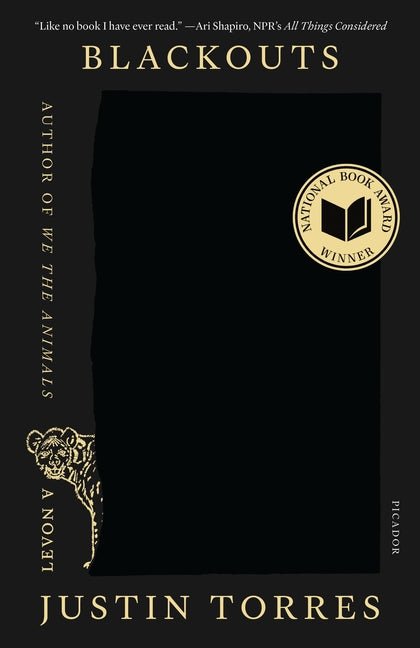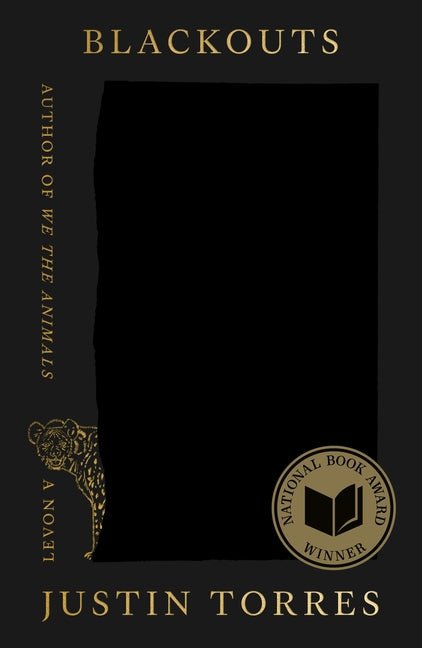Farrar, Straus and Giroux
Blackouts
Couldn't load pickup availability
Winner of the National Book Award
Winner of the California Book Award
Winner of Tournament of Books
Out in the desert in a place called the Palace, a young man tends to a dying soul, someone he once knew briefly but who has haunted the edges of his life: Juan Gay. Playful raconteur, child lost and found and lost, guardian of the institutionalized, Juan has a project to pass along, one built around a true artifact of a book--Sex Variants: A Study of Homosexual Patterns--and its devastating history. This book contains accounts collected in the early twentieth century from queer subjects by a queer researcher, Jan Gay, whose groundbreaking work was then co-opted by a committee, her name buried. The voices of these subjects have been filtered, muted, but it is possible to hear them from within and beyond the text, which, in Juan's tattered volumes, has been redacted with black marker on nearly every page. As Juan waits for his end, he and the narrator recount for each other moments of joy and oblivion; they resurrect loves, lives, mothers, fathers, minor heroes. In telling their own stories and the story of the book, they resist the ravages of memory and time. The past is with us, beside us, ahead of us; what are we to create from its gaps and erasures?
A book about storytelling--its legacies, dangers, delights, and potential for change--and a bold exploration of form, art, and love, Justin Torres's Blackouts uses fiction to see through the inventions of history and narrative. A marvel of creative imagination, it draws on testimony, photographs, illustrations, and a range of influences as it insists that we look long and steadily at what we have inherited and what we have made--a world full of ghostly shadows and flashing moments of truth. A reclamation of ransacked history, a celebration of defiance, and a transformative encounter, Blackouts mines the stories that have been kept from us and brings them into the light.
Share
Book Details
ISBN:
9780374293574
EAN:
9780374293574
Binding:
Hardcover
Pages:
320
Authors:
Justin Torres
Publisher:
Farrar, Straus and Giroux


Justin Torres’s Blackouts is a striking novel that unfolds as one long, intimate conversation. The linear thread of dialogue carries the reader steadily through the text, even as it weaves in nonlinear stories, histories, and fragments. The result is a narrative that feels both experimental and grounded, keeping you engaged from beginning to end.“What is it that the dead eat? He asked me once. A riddle…”The novel offers an exceptional depiction of the LGBTQIA+ experience, blending memory with historical and medical contexts. It prompts readers to question preconceived notions of what is coded as “straight” or “heterosexual” in culture and how those codes are flipped or reclaimed to provide comfort for lives that have so often been erased or marginalized in literature.Even though much of the story centers around a deathbed conversation, Blackouts is not a tale of loss. Instead, it is a meditation on acceptance, a closing of chapters, and above all, a homage to love and freedom in all its forms.With its unexpected turns, lyrical voice, and emotional resonance, Torres delivers a book and audiobook that elegantly captures the essence of living one truth in a world that would rather diagnose. Blackouts is a challenging, beautiful, and deeply human story well beyond its final page.
Great literature.
This is my first exposure to erasure poetry, which I had never even heard of until now. Chunks of an existing text—in this case, a real study of homosexuals from the 1930s called Sex Variants—are blacked out, so that the visible text forms something new. Photos abound in this book, including those of the erasure poetry, which were definitely above my pay grade. Suffice it to say that the non-traditional format of this book rendered it too cerebral for me. Basically, an unnamed gay narrator is trading stories with an elderly gay man named Juan, who is dying. These two men met in a mental institution, and now they are swapping stories, sometimes describing events as if describing a movie—a clever way to set the scene more vividly. The book is a mixture of fact and fiction and may be semi-autobiographical, but one of my chief beefs is that I found it difficult to decipher who was talking—Juan or the narrator, whom Juan calls “nene.” There are pages and pages of dialog with no identification as to who is saying what, except that occasionally the speaker addresses Juan or nene, so that we know that the other character is speaking. There is some fascinating history here, particularly with regard to homosexuality as a mental health condition, but if this book was a test, I failed.
This novel is so unique and compelling. The story structure, and redacted documents add to the reader's revelation in a poetic way. Extremely enjoyable to read, and a fresh presentation of queer intimacy.
Torres uses a “found footage” approach to demonstrate the surreal experience of the enterprising homosexual who attempts to understand his community’s historical relationship with society. Building off a real survey from the 40s about sexual “variants,” the reader is confronted with a world that uses people to discredit themselves. A variation of the inhuman, people who must reject their identity in order to find a shadow of acceptance. The disorientation is almost suffocating. I ding the novel mainly because once he has created this unique insight, it feels as if he is unsure how to end things. By the end, our unreliable narrator becomes even more confused and the ending feels weak after such a strong setup. Still a good way to put yourself in the shoes of another.


